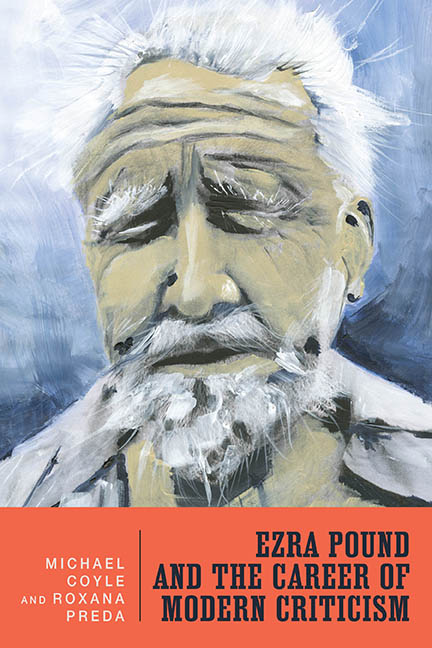Book contents
- Frontmatter
- Dedication
- Contents
- Preface
- Acknowledgments
- 1 From Wabash to Washington, 1907–1947
- 2 A Prize Fight and Institutionalization, 1948–1951
- 3 Kenner, Watts, and Professional Attention, 1951–1961
- 4 Sailing after Knowledge, 1962–1971
- 5 The Pound Era and Its Monumental Companion, 1971–1985
- 6 Pound Studies and the Postmodern Turn, 1980–1990
- 7 Reading Pound in the New Millennium, 1990–2016
- 8 The Many Lives of Ezra Pound: Biographies and Memoirs, 1960–2015
- 9 Educating the World: Periodicals on Ezra Pound, 1954–2017
- Conclusion
- Chronology of the Bollingen Controversy
- Works Cited
- Index
3 - Kenner, Watts, and Professional Attention, 1951–1961
Published online by Cambridge University Press: 17 July 2019
- Frontmatter
- Dedication
- Contents
- Preface
- Acknowledgments
- 1 From Wabash to Washington, 1907–1947
- 2 A Prize Fight and Institutionalization, 1948–1951
- 3 Kenner, Watts, and Professional Attention, 1951–1961
- 4 Sailing after Knowledge, 1962–1971
- 5 The Pound Era and Its Monumental Companion, 1971–1985
- 6 Pound Studies and the Postmodern Turn, 1980–1990
- 7 Reading Pound in the New Millennium, 1990–2016
- 8 The Many Lives of Ezra Pound: Biographies and Memoirs, 1960–2015
- 9 Educating the World: Periodicals on Ezra Pound, 1954–2017
- Conclusion
- Chronology of the Bollingen Controversy
- Works Cited
- Index
Summary
It's only when a few men who know, get together and disagree that any sort of criticism is born.
—Ezra Pound, 1913 Letter to Harriet MonroeThe Pound Wars Get Institutionalized
PUBLIC ATTENTION WAS STILL LINGERING over l'affaire Pound in the summer of 1951 when Hugh Kenner's The Poetry of Ezra Pound dismissed it for good. It did not do so by overtly hostile gestures, or by presenting incontrovertible arguments about the Bollingen controversy. It was instead silent about Pound's political activities, reticent about Pound's biography, and studiously inattentive to the concerns available to most middle-class readers. It was a splendid performance that never for an instant allowed the relevance of anything besides aesthetic and strictly poetic questions. It was also a performance the reception of which would have been impossible at any earlier moment, let alone in the heat of the Bollingen controversy. The Poetry of Ezra Pound was as perfectly the creature of its historical moment as it was the creator of academic discourse on Ezra Pound.
The anxious justifications of Tate, Berryman, and Carruth prepared Kenner's ground, and informed not only what Kenner argued but how. Most dramatically, perhaps, the terms in which the Library Fellows defended their judgment bristle just underneath Kenner's opening, a first chapter entitled “A Prefatory Distinction,” which dismisses the passion of the previous two years in two short sentences:
The Pisan Cantos were … during a few months of 1949 more “in the news” (for irrelevant reasons) than perhaps any volume of poetry in modern times. They were widely written off as a dead loss, and all sorts of alarming implications were read into their author's receipt of the Bollingen Prize for Poetry at the hands of a committee of fellow poets. (16)
A disarming representation to be sure: the scare quotes around “in the news,” and the suggestion that “a committee of fellow poets” cannot but be harmless, render bathetic the indignation and high feeling previously exhibited on both sides of the Bollingen question. Pisan Cantos were not merely “in the news,” but the basis of Kenner's saying so is evident in that parenthesis tossed off en passant: “(for irrelevant reasons).” That is, the parenthesis assumes that the appreciation of poetry has little to do with political apperception, and does not submit this assumption to discussion.
- Type
- Chapter
- Information
- Ezra Pound and the Career of Modern CriticismProfessional Attention, pp. 47 - 75Publisher: Boydell & BrewerPrint publication year: 2018



